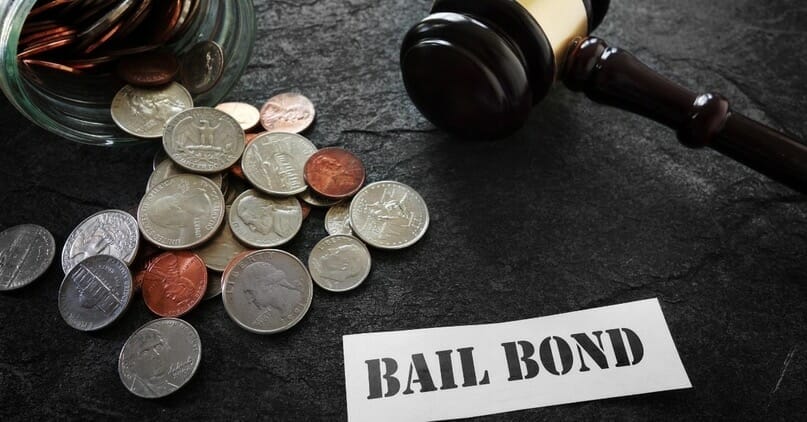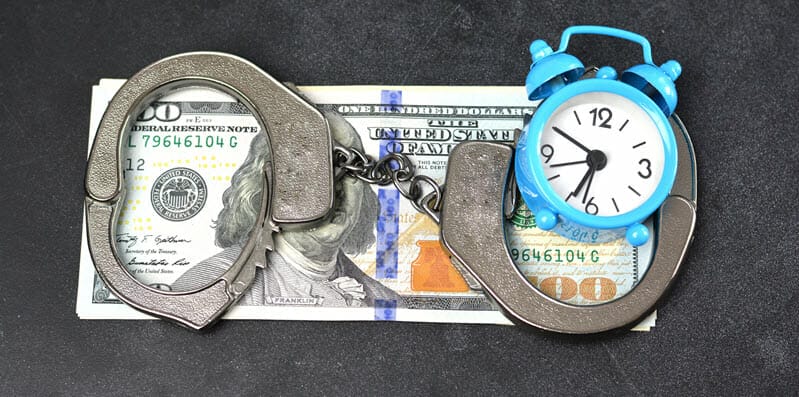
- Felonies
- *
- Misdemeanors
- *
- Drug/Narcotics Violations
- *
- Sex Offenses
- *
- Gun / Weapons Violations
- *
- Robbery
- *
- Burglary
- *
- Assault
- *
- Theft
- *
- White Collar Crimes
- *
- Domestic Assualt
- *
- Property Damage
- *
Understanding the Difference Between Bail and Bond
The words bail and bond may seem interchangeable, but they are different terms with different meanings. If you or a loved one are taken into police custody and charged with a crime, you need to know the definition of these two words and what they mean to you.
Understanding the Key Differences Between Bail and Bail Bonds
Many people ask what's the difference between bail and bond. The answer to the question of what's the difference between bail and bond is bail is an amount of money set by a judge that must be paid to a court if the defendant wants to be released from jail. A Bond is something a defendant seeks (like a bail bond) if they cannot afford to pay the bail, but wants to be released.
While bail vs. bond may be closely-related terms, they are not the same. Although both provide a defendant with temporary freedom from jail, some key aspects differentiate the two.
What Is Bail?
This is the amount of cash a defendant must pay to get out of jail until their court date. A judge determines an individual's bail based on the charges, criminal history, whether or not they commit additional crimes and the flight risk of the defendant.
Bail is set because it helps secure the defendant's return to their scheduled court dates. You may consider bail as collateral. Should a defendant fail to appear in court or adhere to the terms of their release, they could forfeit their money.
What Is a Bond?
Bail bonds are something a defendant seeks if they cannot afford to pay the set bail amount set forth by the judge. If you or a loved one get arrested and charged with a crime, you can seek a bond from a bail bondsman on the defendant's behalf.
The defendant and co-signer will pay a certain percentage of the bail bonds to get approved. The money paid is a fee charged by the bondsman, but the state dictates the percentage amount. This paid percentage amount is not refunded, even if the defendant shows up for all court dates and follows all the terms of their release agreement.
The defendant must also put up collateral for the remaining amount of the bail. Should you fail to show up for court or break the terms of your release, the collateral goes to the bondsman to cover the costs of your bail.
What Is the Role of a Bail Bond Company?
A bail bond company plays a crucial role in the legal system. Without a bail bond company, many people would have lengthy jail time because they could not pay their bail. Choosing the right bail bond professionals is important to ensure the process of getting a bond is as stress-free as possible.
Understanding the Bail Hearing Process
An arrest is just the beginning of the process. Once you are arrested, you are booked, and all paperwork is filled out and filed while you are placed in a jail cell.
You will get a bail hearing scheduled within 48 hours. At this hearing, the judge will set your bail amount. This is the amount that you must pay to get out of jail. The set bail amount is based on several factors, including the crime you are accused of committing.
At the bail hearing, the following are the possible rulings you will get from the judge.
- “Release on Own Recognizance” means you are released without posting bail but must sign a promise to show up for all your court dates.
- “Personal Bond” means you sign a personal bond agreement that you will appear in court for all required dates. With a personal bond, you may face criminal or civil penalties if you miss your court appearances.
- “Bail Set With Terms of Release” means you must pay bail or seek a bondsman to get released.
- “Denial of Bail” is sometimes the ruling people get when they have committed a serious crime, such as murder.
Once the judge sets bail, you have the option to post bail in cash. Like many people, you may need help from a bail bond company. A bond company steps in and offers a surety bond to help with the bail process.
Before being released, you must know all court dates and the terms of your release. Failure to follow these and appear in court will cost you your bail money or collateral.
Allow Us to Help You Understand the Process
As a bail bond company, we understand this is a confusing and stressful time, especially if you have never been arrested before. Allow us to help you understand your bail bond options and reduce your jail time.











